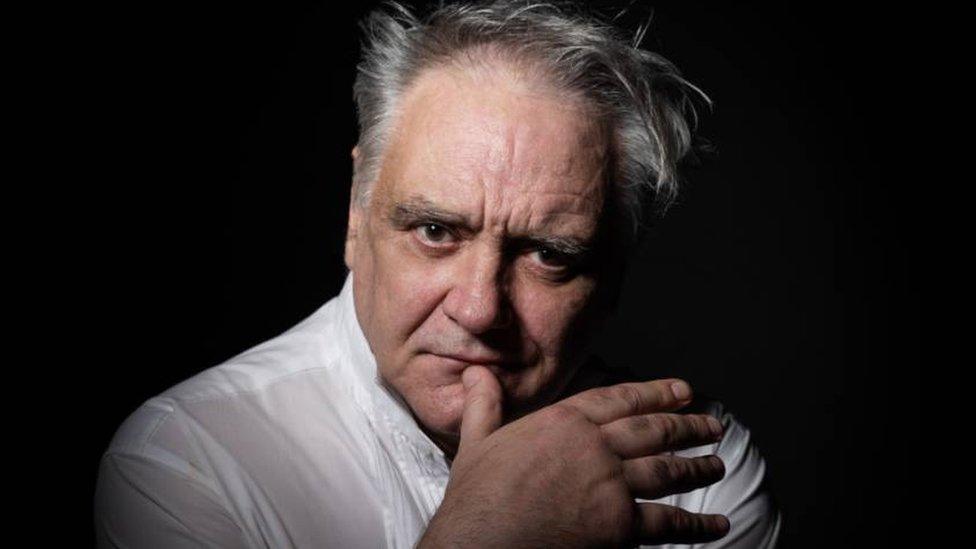Tony Slattery 'moved' by reaction to documentary
- Published

Comedian Tony Slattery has said he's been "genuinely moved" by the reaction to the documentary about his battles with depression and drug addiction.
What's the Matter with Tony Slattery?, on BBC Two's Horizon on Thursday, was broadcast following a revealing article in The Guardian, external in 2019.
The programme followed the Whose Line Is It Anyway? star as he attempted to connect the dots between his undiagnosed bipolar tendencies, drug and alcohol use, and the abuse he suffered as a child by a priest.
"I'm genuinely moved by all your messages of love, kindness, & support," he wrote on Twitter, external on Friday, paying special homage to his long-time partner Mark - "the love of my life".
Slattery was an improvisational stand-up comedy TV star of the 80s and 90s, but withdrew from the public eye afterwards, due to deep-rooted and wide-ranging personal issues.
The documentary saw him return to the stage in front of a live audience for the first time in decades.
Viewers from around the worlds of medicine, comedy and beyond have praised him for finally telling his story.
Allow X content?
This article contains content provided by X. We ask for your permission before anything is loaded, as they may be using cookies and other technologies. You may want to read X’s cookie policy, external and privacy policy, external before accepting. To view this content choose ‘accept and continue’.

Stephen Fry,, external who appeared in the feature to discuss his own experiences of mental health issues, described Slattery - a fellow ex-member the Cambridge University Footlights comedy set - as being "painfully honest and as always utterly lovable".
"No-one in their right mind chooses to be depressed," Slattery told his old friend Fry in the programme.
Another comedian and broadcaster, Robin Ince, external, said it was "sad to watch" but "a documentary that is definitely worth your time".

A young Tony Slattery alongside Stephen Fry and Emma Thompson in the Cambridge Footlights Revue
Ahead of the showing going out, Slattery told the Today programme's Nick Robinson it was "a privilege" to speak to experts about such issues, which he says are "widespread, regardless of class or upbringing or money".
"There was denial," he added. "Because I thought, 'look, some things happened a quarter of a century ago, I'm 60 now, [it was] when I was eight, what is the point?'"
Slattery admitted on-screen that he worried the show was too "self-regarding", but just hoped it might at least help others in similar situations.
'Redeemed by love'
The Times, external gave the feature five stars, with Carol Midgley, writing it was about "how a comedian's tragedy was redeemed by love".
Lucy Mangan in The Guardian, external awarded four stars, calling it "a moving study of drink, depression and abuse".
"Horizon's respectful and sensitive look at the comedian's life and struggles with addiction is a beacon of the genre," she wrote.
"It was tough to watch the brightest of stars so dimmed," added Anita Singh in The Telegraph, external, also opting for four stars, while adding it was "a brave film to make".

What is bipolar disorder?
There are different types of bipolar. Those with type 1 experience periods of manic highs and depressive lows. Those with type II experience severe depression and mild manic episodes - known as hypomania - that last for a shorter period of time. Those with cyclothymia experience less severe mood swings, but they can last longer.
During a manic episode, those with bipolar disorder can feel euphoric and have lots of energy, ambitious plans and ideas. But they can become aggressive, and experience symptoms of psychosis.
The exact cause of bipolar disorder is unknown. Some experts believe it can be developed as a result of severe emotional distress as a child, as well as genetic and chemical factors.
One in every 100 UK adults will be diagnosed with the condition at some point in their life.
Sources: NHS, Royal College of Psychiatrists and Mind

Follow us on Facebook, external, or on Twitter @BBCNewsEnts, external. If you have a story suggestion email entertainment.news@bbc.co.uk, external.
- Published15 May 2019

- Published11 April 2018
